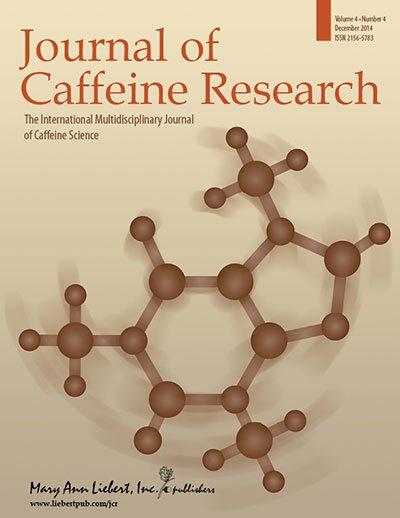For Immediate Release
Do Caffeine's Effects Differ With or Without Sugar?
Contact: Kathryn Ryan
914-740-2250
kryan@liebertpub.com

New Rochelle, NY, December 16, 2014–Consuming caffeinated or sugary drinks can affect the body's metabolism, causing changes in heart and respiratory rate and weight gain. The results of a new study exploring whether individuals respond differently to caffeinated drinks that do or do not contain sugar and to sugar alone are published in Journal of Caffeine Research: The International Multidisciplinary Journal of Caffeine Science, a peer-reviewed publication from Mary Ann Liebert, Inc., publishers. The article is available free on the Journal of Caffeine Research website until January 16, 2015.
The article entitled “Caffeine With and Without Sugar: Individual Differences in Physiological Responses During Rest,” by Elaine Rush, PhD and coauthors, Auckland University of Technology (Auckland, New Zealand), describes a study in which heart rate and carbon dioxide production (as a measure of respiration) were measured 30 minutes before and after individuals consumed a defined quantity of sugar, caffeine, or sugar and caffeine. Responses to the different treatments varied widely among individuals.
“Given the caveat that sugar itself affects brain reward just as caffeine does, and this effect will in itself cause variations, this is still an essential paper for the scientist and the lay person to read,” says Patricia A. Broderick, PhD, Editor-in-Chief of Journal of Caffeine Research, Medical Professor in Physiology, Pharmacology & Neuroscience, The Sophie Davis School of Biomedical Education, The City College of New York, The City University of New York, and Adjunct Professor in Neurology, New York University Langone Medical Center and Comprehensive Epilepsy Center.
About the Journal
Journal of Caffeine Research: The International Multidisciplinary Journal of Caffeine Science is a quarterly journal published in print and online. The Journal covers the effects of caffeine on a wide range of diseases and conditions, including mood disorders, neurological disorders, cognitive performance, cardiovascular disease, and sports performance. Journal of Caffeine Research explores all aspects of caffeine science including the biochemistry of caffeine; its actions on the human body; benefits, dangers, and contraindications; and caffeine addiction and withdrawal, across all stages of the human life span from prenatal exposure to end-of-life. Tables of content and a sample issue may be viewed on the Journal of Caffeine Research website.
About the Publisher
Mary Ann Liebert, Inc., publishers is a privately held, fully integrated media company known for establishing authoritative peer-reviewed journals in many promising areas of science and biomedical research, including Breastfeeding Medicine, Journal of Medicinal Food, and Journal of Child and Adolescent Psychopharmacology. Its biotechnology trade magazine, Genetic Engineering & Biotechnology News (GEN), was the first in its field and is today the industry's most widely read publication worldwide. A complete list of the firm's 80 journals, books, and newsmagazines is available on the Mary Ann Liebert, Inc., publishers website.